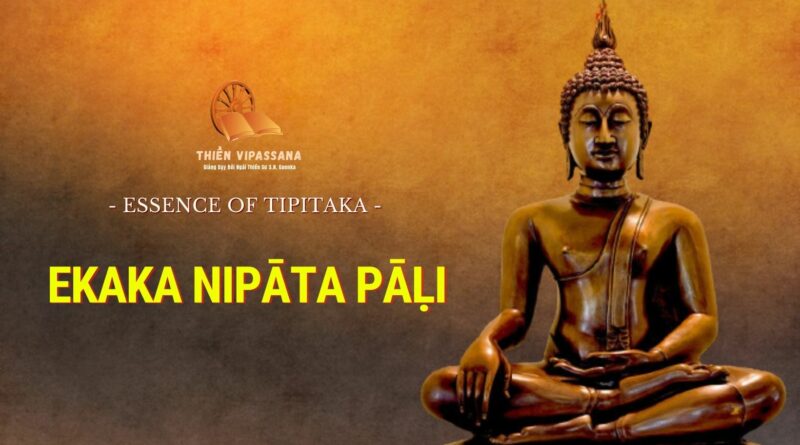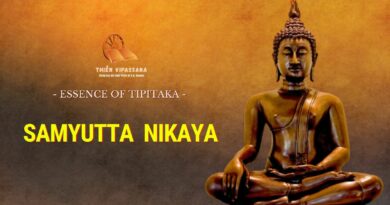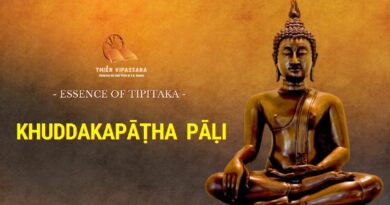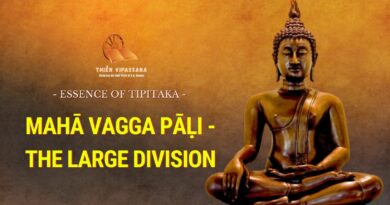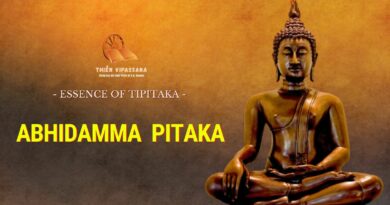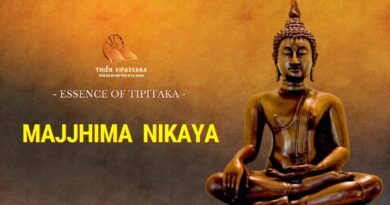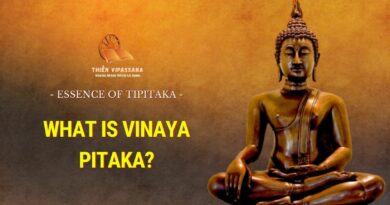1 Ekaka Nipāta Pāḷi
This group contains single items of Dhamma which form the subject matter of discourses given by the Buddha at Sāvatthi to the numerous bhikkhus residing there. But some of the suttas were given by the Venerable Sāriputta or the Venerable Ānanda.
(b) There is no other single thing that brings about so much disadvantage and unhappiness as an undeveloped and uncultivated mind. A developed and cultivated mind brings about benefit and happiness. (paras 28 to 31)
(c) No other single thing changes so quickly as the mind. The mind is intrinsically pure and bright; it is defiled by greed, hatred and ignorance. (paras 48, 49)
(d) If a bhikkhu practises the meditation of loving-kindness, develops it even for the short duration of a fingersnap, he is regarded as following the advice of the Buddha, acting according to his instructions. Such a bhikkhu deserves to eat the alms-food offered by the people. (paras 53, 54)
(e) There is only one person whose appearance in the world brings welfare and happiness to the many, brings benefit, welfare and happiness to devas and men. It is a tathāgata, a fully enlightened Buddha.
It is impossible for two enlightened Buddhas to appear simultaneously in the same world system. (paras 170 to 174)
(f) It is impossible for a person possessed of right views, i.e. a sotāpanna, to regard any conditioned formation as permanent, happiness, self (nicca, sukha, atta). It is possible only for an uninstructed worldling to regard anything as permanent, happiness, self. (paras 268 to 270)
(g) If one thing is developed and frequently practised, the body is calmed, the mind is calmed, discursive thinking is stilled, ignorance is shed, knowledge arises, delusion of self is eliminated, evil tendencies are eradicated, the fetters are removed. That one thing is the mindful contemplation of the body. (paras 571 to 576)
2 Duka Nipāta Pāḷi
(b) There are two potentialities of men: to do good or to do evil. It is possible to abandon evil; abandoning of evil brings benefit and happiness. It is also possible to cultivate good. Cultivation of goodness also brings benefit and happiness. (para 19)
(c) Two things are conducive to attainment of liberation in two ways: concentration meditation and insight meditation. If concentration is developed, the mind becomes developed and passion fades away resulting in liberation of mind. If insight is developed, wisdom is developed and ignorance fades away resulting in liberation by knowledge. (para 32)
(d) There are two persons one can never repay: mother and father. Even if one should live a hundred years during which one attends upon one’s mother and father, heaps all one’s attention, love and personal service on them, one can never repay them for having brought up, fed and guided one through this life.
But if a person causes his parents who are non-believers to become established in the faith and to take refuge in the Buddha, the Dhamma and the Sangha; if he causes his parents who do not observe the precepts to become established in morality; if he causes his miserly parents to become generous so that they come to share their wealth with the poor and the needy; if he causes his ignorant parents to become established in the knowledge of the Four Truths, then such a person repays and more than repays his parents for what they have done for him. (paras 33, 34)
(e) There are two kinds of happiness: the happiness of the home life and the happiness of homelessness; the happiness of homelessness is superior.
…the happiness of the senses and happiness of renunciation; the happiness of renunciation is superior.
…tainted happiness and untainted happiness; … carnal and non-carnal happiness; … and ignoble and noble happiness; … bodily and mental happiness; mental happiness is superior. (paras 65 to 71)
3 Tika Nipāta Pāḷi
(b) There are three places a sovereign king should not forget: his birth place, the place where he was crowned as king and the site of battle in which he conquered his enemies. There are three places a bhikkhu should not forget: the place of renunciation, the place where he achieved the knowledge of the Four Noble Truths and the place where he attained arahatship. (para 12)
(c) He who devotes himself earnestly to his business in the morning, in the daytime and in the evening will prosper and grow in wealth; the bhikkhu who devotes himself earnestly to development of concentration in the morning, in the daytime and in the evening will progress and gain advancement in his spiritual work. (para 19)
(d) These three types of persons are found in the world: one with a mind like an open sore; one with a mind like a flash of lightning; one with a mind like a diamond. One who is irascible and very irritable, displaying anger, hatred and sulkiness; such a one is said to be a person with a mind like an open sore. One who understands the Four Noble Truths correctly is said to have a mind like a flash of lightning. One who has destroyed the mind-intoxication defilements and realized the liberation of mind and the liberation by knowledge is said to have a mind like a diamond. (para 25)
(e) There are these three kinds of individuals in the world: one who speaks words reeking with foul smell; one who speaks words of fragrance; and one who speaks words sweet as honey. (para 28)
(f) There are three root causes for the origination of actions (kamma): greed, hatred and ignorance. An action done in greed, hatred and ignorance will ripen wherever the individual is reborn; and wherever the action ripens, there the individual reaps the fruit (vipāka) of the action, be it in this life, in the next life or in future existences. (para 38)
(g) He who prevents another from giving alms hinders and obstructs three persons. He causes obstruction to the meritorious act of the donor; he obstructs the recipient in getting his gift; he undermines and harms his own character. (para 58)
(h) Three dangers from which a mother cannot shield her son nor the son his mother: old age, disease and death. (para 63)
(i) The well-known sutta, Kesamutti Sutta, also known as Kālāma Sutta, appears as the fifth sutta in the Mahā Vagga of the Tika Nipāta. At Kesamutta, a small town in the Kingdom of Kosala, the Buddha thus exhorted the Kālāmas, the inhabitants of the town: “Do not be led by reports or traditions, or hearsay. Do not be led by the authority of religious texts, nor by mere logic or inference, nor by considering appearances, nor by speculative opinion, nor by seeming possibilities, nor because one’s own teacher has said so. Oh Kālāmas, when you know for yourselves that certain things are wrong, unwholesome, bad, then give them up; when you know for yourselves that certain things are right, wholesome, good, then accept them, follow them.” (para 66)
(j) A bhikkhu devoted to the holy life should pay equal attention to three factors in turn, namely, concentration, energetic effort and equanimity, and not exclusively to one of these factors only. If he gives regular attention to each of them, his mind will become soft, pliant, malleable, lucid and well concentrated, ready to be directed to whatever mental states are realizable by supernormal knowledge. (para 103)
(k) There are three rare persons in the world: a tathāgata who is a perfectly enlightened one is rare in the world; a person who can expound the teaching and discipline as taught by the Buddha is rare in this world; and a person who is grateful and thankful is rare in the world. (para 115)
(l) Whether a tathāgata appears in the world or not, the fact remains as a firm and inevitable condition of existence that all conditioned formations are impermanent, that all conditioned formations are subject to suffering, that all things are devoid of self. (para 137)
4 Catukka Nipāta Pāḷi
The person who indulges in sense desires and commits wrong deeds is one who goes with the stream. He who does not indulge in sense desires or commit wrong deeds, but lives the pure, chaste life, struggling painfully and with difficulty to do so, is one who goes against the stream. He who stands firm is the person, who having destroyed the five lower fetters is reborn spontaneously in the Brahmā realm, where he realizes nibbānawithout ever returning to the sensuous sphere. The one who has gone to the other shore standing on dry land is the person who has destroyed all the mental intoxicants, and who has realized, in this very life, by himself, the liberation of the mind and liberation by knowledge. (para 5)
(b) There are four Right Efforts:
(ii) the energetic effort to get rid of evil, unwholesome states of mind that have already arisen;
(iii) the energetic effort to arouse good, wholesome states of mind that have not yet arisen;
(iv) the energetic effort to develop and bring to perfection the good and wholesome states of mind already arisen. (para 13)
(c) As a tathāgata speaks, so he acts; as he acts, so he speaks. Therefore he is called a tathāgata. (para 23)
(d) There are four highest kinds of faith: the tathāgata, the holiest and fully enlightened, is the highest among all living beings. Among all conditioned things, the Noble Path of Eight Constituents is the highest. Among all conditioned and unconditioned things, nibbāna is the highest. Amongst all groups of men, the order of the tathāgata, the Sangha made up of the four pairs of noble men, the eight ariyas is the highest.
For those who have faith in the highest, namely, the Buddha, the path, the nibbāna and the ariyas, the highest result will be theirs. (para 34)
(e) There are four ways of dealing with questions:
(i) Some should be given direct answers;
(ii) Others should be answered by way of analysing them;
(iii) Some questions should be answered by counter-questions;
(iv) Lastly, some questions should simply be put aside. (para 42)
(f) There are four distortions (vipallāsas) in perception, thought and view. To hold that there is permanence in the impermanent; to hold that there is happiness in suffering; to hold the there is atta where there is no atta; to hold that there is pleasantness (subha) in that which is foul. (para 49)
(g) When Nakulapitā and Nakulamātā express their wish to the Buddha to be in one another’s sight as long as the present life lasts and in the future life as well, the Buddha advises them to try to have the same faith, the same virtue, the same generosity and the same wisdom; then they will have their wish fulfilled. (paras 55-56)
(h) He who gives food gives four things to those who receive it. He gives them long life, beauty, happiness and strength. The donor himself will be endowed with long life, beauty, happiness and strength wherever he is born in the human or the deva world. (para 57)
(i) There are four subjects not fit for speculative thought (acinteyyāni). They are: the specific qualities of a Buddha (buddhavisayo); a person’s jhāna attainment; the results of kamma; and the nature of the world. These imponderables are not to be pondered upon; which, if pondered upon, would lead one to mental distress and insanity. (para 77)
(j) There are four things concerning which no one whether samaṇa, brāhmaṇa, deva, māra or anyone else in the world can give a guarantee:
(i) That which is liable to decay should not decay;
(ii) That which is liable to illness should not fall ill;
(iii) That which is liable to die should not die; and
(iv) That no resultant effect should come forth from those evil deeds done previously. (para 182)
(k) There are four ways by which a person’s character may be judged:
His virtue can be known by a wise and intelligent person paying close attention after living together with him for a very long time. His integrity can be known by a wise and intelligent person by having dealings with him, paying close attention for a period of long time. His fortitude can be known by a wise and intelligent person by observing him in close attention in times of misfortune. His wisdom can be judged by a wise and intelligent person when conversing with him on various subjects over a long period of time. (para 192)
(l) There are four things conducive to the growth of wisdom: associating with a good person; hearing the good Dhamma; maintaining a right attitude of mind and leading a life in accordance with the Dhamma. (para 248)
5 Pañcaka Nipāta Pāḷi
(b) There are also five strengths, namely faith, energy, mindfulness, concentration and insight-knowledge. The strength of the faith is seen in the four characteristic qualities of a stream-winner; the strength of the energy is seen in the four Right Efforts; the strength of mindfulness is seen in the four methods of steadfast mindfulness and the strength of concentration is seen in the four jhānas; the strength of the insight-knowledge is seen in the perception of the phenomenon of constant arising and ceasing, an insight which will finally lead to nibbāna. (para 14)
(c) Impurities that defile gold are iron, tin, lead, silver and other metals. Impurities that defile mind are sensuous desire, ill will, sloth and torpor, restlessness and worry, sceptical doubts. (para 23)
(d) A giver of alms surpasses a non-giver in five aspects, namely, in life-span, beauty, happiness, fame and power, whether both be reborn in the deva world or the human world. This difference in five aspects will persist until liberation is achieved. Then there is no distinction between the liberation of one and the other or between one arahat and the other. (para 31)
(e) There are five contemplations which ought to be practised by everyone, bhikkhus or lay folks, men and women:
“I am certain to become ill and diseased. I cannot avoid illness.”
“I am certain to die. I cannot avoid death.”
“All things dear and beloved will not last. They will be subject to change and separation.”
“My kamma (past and present actions) is my only property, kamma is my only heritage, kamma is the only cause of my being, kamma is my only kin, my only protection. Whatever actions I do, good or bad, I shall become their heir.” (para 57)
(f) Five standards which should be set up for teaching the Dhamma: the Dhamma should be taught in graduated discourses; the Dhamma should be given as a well-reasoned discourse; the Dhamma should be given out of compassion and sympathy; the Dhamma should not be given for the sake of worldly gain and advantage; the Dhamma should be taught without alluding to oneself or the others. (para 159)
(g) There are five ways of getting rid of a grudge: if a grudge arises towards any person, then one should cultivate loving-kindness, or compassion or equanimity towards him. Or one should pay no attention to him and give no thought to him. Or one may apply the thought: his only property is his actions; whatever he does, good or bad, he will be the heir to that. In these ways all grudges that have arisen can be removed. (para 161)
(h) Wrong occupations which should not be followed by a lay disciple: trading in arms and weapons; trading in living beings; trading in meat; trading in intoxicants; trading in poison. (para 177)
6 Chakka Nipāta Pāḷi
(b) There are six kinds of suffering in the world for one who indulges in sense-pleasures: poverty, indebtedness, owing interest, being demanded repayment, being pressed and harassed by creditors, imprisonment.
Similarly in the teaching of the ariyas, a person is regarded to be poor and destitute who lacks faith in things that are meritorious, who has no shame and no scruples, no energy and no understanding of things that are good, and who conducts himself very badly in deed, word and thoughts. (para 45)
(c) There are six steps to gain liberation: sense-control provides the basis for morality. Morality gives the foundation to Right Concentration. Right Concentration provides the basis for understanding of the true nature of physical and mental phenomena. With the understanding of the true nature of the physical and the mental phenomena comes disenchantment and non-attachment. Where there is disenchantment and non-attachment, there arises the knowledge and vision of liberation. (para 50)
(d) There are six things to be known: sense-desires, feelings, perceptions, moral intoxicants (āsavas), kammas and dukkha. Their causal origin should be known, their diversity, their resulting effects, their cessation and the way leading to their cessation should be known.
The way leading to the cessation of all the dhammas is the Noble Path of Eight Constituents. (para 63)
(e) There are six things which appear very rarely in the world: rare is the appearance in the world of a perfectly enlightened Buddha; rare is the appearance of one who teaches the Dhamma and Vinaya as proclaimed by the Buddha; rare it is to be reborn in the land of the ariyas; rare it is to be in the possession of unimpaired physical and mental faculties; rare it is to be free from dumbness and stupidity; rare it is to be endowed with the desire for doing good, wholesome things. (para 96)
(f) There are six benefits in realizing the sotāpatti:
(i) Firm faith in the Dhamma,
(ii) Impossibility of falling back,
(iii) A limit to suffering in the round of existences (no more than seven more existences),
(iv) Being endowed with supramundane knowledge which is not shared by the common worldling,
(v) And (vi) clear understanding of the causes and the phenomena arising from them. (para 97)
7 Sattaka Nipāta Pāḷi
(b) A bhikkhu becomes an eminent field for sowing seeds of merit, when he knows the text of the teaching, knows the meaning of the teaching, also knows himself, knows the proper limit for acceptance of offerings, knows the proper time for various activities, knows his audience, and knows the spiritual tendency of an individual. (para 68)
(c) If a bhikkhu develops his mind in the four methods of steadfast mindfulness, the four right efforts, the four bases of psychic power, the five faculties, the five strengths, the seven factors of enlightenment, the Noble Path of Eight Constituents, he will be freed of the mental intoxicants, without any attachment, whether he wishes or not for liberation. (para 71)
(d) Short is the life of a man, just like the dew-drop on the tip of a blade of the grass; a bubble appearing on the water when rain falls; a line drawn on water with a stick; a mountain stream; a lump of spittle on the tip of the tongue; a piece of meat thrown into an extremely hot iron pot; and a cow being led to be slaughtered-whenever she lifts a leg, she will be closer to slaughter, closer to death. (para 74)
(e) Those teachings that lead to disenchantment, entire turning away from worldliness, non-attachment, cessation and calm, direct knowledge, enlightenment and nibbāna-such teachings may be taken as the true Dhamma and discipline, as the Buddha’s teaching. (para 83)
8 Aṭṭhaka Nipāta Pāḷi
(b) There are eight worldly conditions, the vicissitudes of life that keep the world turning around: gain, loss, fame, disrepute, praise, blame, happiness, suffering. (para 546)
(c) There are eight strengths: the strength of a child lies in crying; of a woman in her anger; of a bandit in his arms; of a king in his sovereignty; of an unwise man in censure and reviling; of a wise man in careful consideration of pros and cons; of a man of knowledge in caution; and the strength of a bhikkhu lies in his fortitude and forbearance. (para 27)
(d) Eight great reflections of the Venerable Anuruddha on the Dhamma: this Dhamma is for one with few wants, not for one who wants much; this Dhamma is for the contented, not for one hard to be satisfied; this Dhamma is for the one who loves solitude, not for the one who loves company; this Dhamma is for the energetic, not for the indolent; this Dhamma is for the one of vigilant mindfulness, not for the heedless; this Dhamma is for the one of the concentrated mind, not for the distracted; this Dhamma is for the wise, not for the unintelligent; this Dhamma is for the one who delights in nibbāna, not for the one who rejoices in worldliness (conceit, craving and wrong view). (para 30)
(e) There are eight types of speech by an ariya: having not seen, he says he has not seen; having not heard, he says he has not heard; having not sensed, he says he has not sensed; having not known, he says he has not known. Having seen, he says he has seen; having heard, says he has heard; having sensed, he says he has sensed and having known, he says he has known. (para 68)
9 Navaka Nipāta Pāḷi
(b) There are nine characteristics of a layman’s residence which a bhikkhu should not visit or stay in: where a bhikkhu is not greeted or shown signs of welcome, or offered a seat; where alms are kept hidden; where little is given away although much can be afforded; where inferior alms are offered although better alms are available; where the offering is made in a disrespectful manner; where the layman does not come near the bhikkhu to listen to the Dhamma, and where little interest is shown in the exposition of Dhamma. (para 17)
(c) There are nine ways in which a grudge is formed: he has done me harm, he is doing me harm, he will do me harm; he has done harm to one dear to me, he is doing harm to one dear to me, he will do harm to one dear to me; he has done good to one disliked by me; he is doing good to one disliked by me; he will do good to one disliked by me. (para 29)
(d) There are nine things which should be eliminated in order to achieve realization of arahatta phala: lust, ill will, ignorance, anger, grudge, ingratitude, envy, jealousy, meanness. (para 62)
10 Dasaka Nipāta Pāḷi
(b) There are ten fetters: personality belief (sakkāyadiṭṭhi), sceptical doubts, mistaking mere rites and ceremony as the true path, sense-desire, ill will, attachment to the rūpa realm, attachment to the arūpa realm, conceit, restlessness, ignorance. (para 12)
(c) Just as a young man or woman looks into the mirror to find out if there are any blemishes on the face, so also it is necessary for a bhikkhu to engage in occasional self-examination to see whether covetousness, ill will, sloth and torpor have arisen in him or not; whether worry and excitement, and doubts exist in him; whether he is free from anger and if his mind is defiled or not by unwholesome thoughts; whether his body is at ease without restlessness; whether he is beset by laziness or not; and whether he has concentration of mind with clear comprehension. (para 51)
(d) There are ten dhammas possessed by one who has become accomplished, an arahat: Right View, Right Thought, Right Speech, Right Action, Right Livelihood, Right Effort, Right Mindfulness, Right Concentration, Right Knowledge, Right Liberation, (para 112).
11 Ekādasaka Nīpata Pāḷi
(b) There are eleven benefits derived from cultivation and development of loving-kindness, when frequently practised and firmly established: one sleeps soundly and wakes peacefully with no bad dreams; one is regarded with esteem by men; is treated with respect by non-humans; is protected by devas; is unharmed by fire, poison or weapons; one’s mind is easily concentrated; the features of one’s face are serene, one will die with an unconfused mind; if one does not attain the state of arahat, one will be reborn in the Brahmā realm. (para 15)
8. KHUDDAKA NIKĀYA
Of all the five nikāyas Khuddaka Nikāya contains the largest number of treatises (as listed below) and the most numerous categories of Dhamma. Although the word khuddaka literally means minor or small, the actual content of this collection can by no means be regarded as minor, including as it does the two major divisions of the Piṭaka, namely, the Vinaya Piṭaka and the Abhidhamma Piṭaka according to one system of classification. The miscellaneous nature of this collection, containing not only the discourses by the Buddha but compilations of brief doctrinal notes mostly in verse, accounts of personal struggles and achievements by theras and therīs also in verse, the birth stories, the history of the Buddha, etc., may account for its title.
The following is the list of treatises of Khuddaka Nikāya as approved by the Sixth International Buddhist Synod:
B. Abhidhamma Piṭaka
C. Suttas not included in the first four nikāyas
2. Dhammapada
3. Udāna
4. Itivuttaka
5. Suttanipāta
6. Vimānavatthu
7. Petavatthu
8. Theragāthā
9. Therīgāthā
10. Jātaka
11. Niddesa (Mahā, Cūḷa)
12. Paṭisambhidā Magga
13. Apadāna
14. Buddhavaṃsa
15. Cariyā Piṭaka
16. Netti
17. Peṭakopadesa
18. Milindapañha

